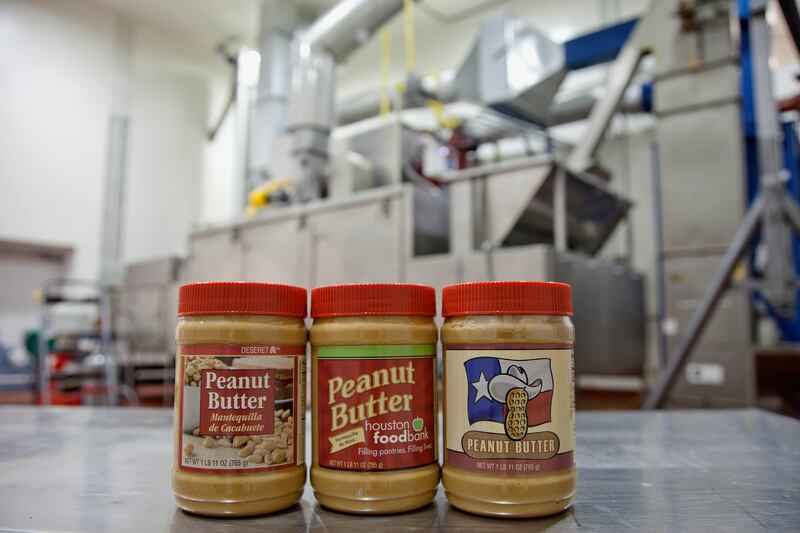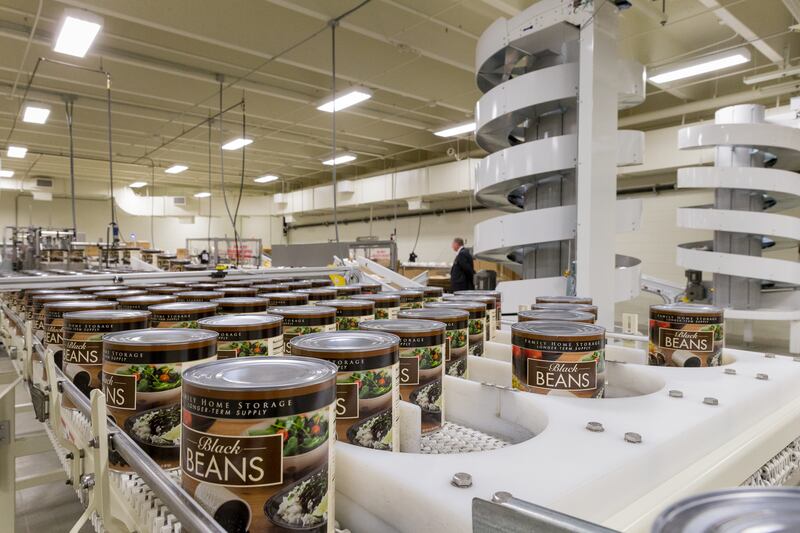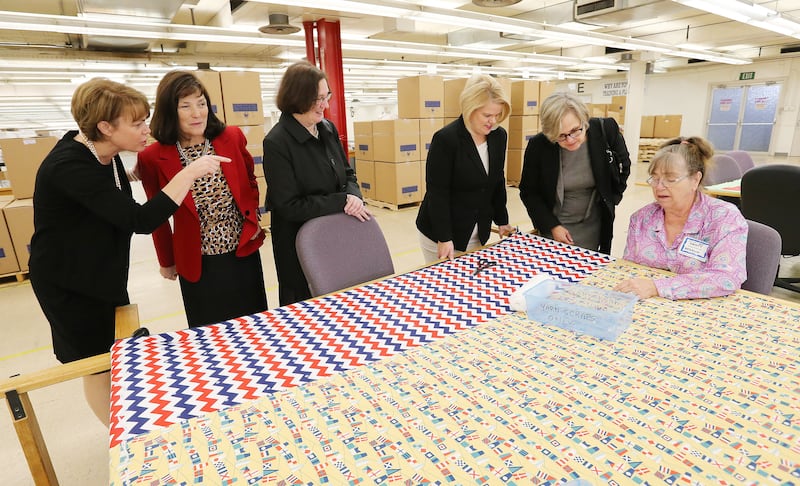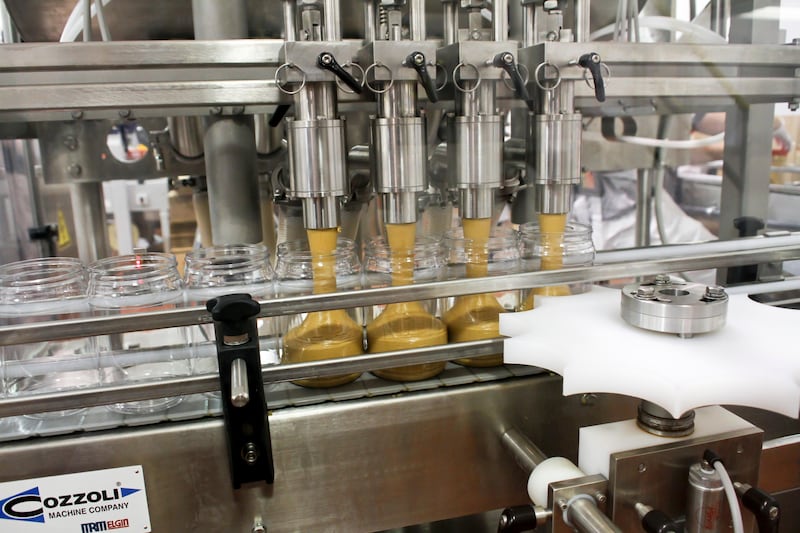SALT LAKE CITY — Latter-day Saint Charities is ramping up production at its canneries and food processing plants during the COVID-19 crisis, while at the same time donating medical and emergency supplies to 16 countries.
The additional food will help people in need amid reports that jobless claims in the United States rose 33% last week and are accelerating even faster this week as businesses react to the pandemic.
Latter-day Saint Charities will make the food available to church leaders supporting their congregations as well as to food banks, community agencies and school food programs, said the organization’s president, Sister Sharon Eubank, first counselor in the Relief Society general presidency.
Iran, Italy and China are among the nations receiving medical and emergency supplies, support and funding from the humanitarian arm of The Church of Jesus Christ of Latter-day Saints, she said in a phone interview.
Some of that aid directly helps with the prevention and treatment of COVID-19. For example, the church is helping to provide N95 masks, gloves and hand sanitizer in Iran, where 50 new infections and one new death are happening every 10 minutes, Sister Eubank said.
The aid to Iran is happening through a partnership with Moms Against Poverty, which is licensed by the U.S. government to provide humanitarian aid to that country while it is under U.S. sanctions.
“We’re fortunate to have that partnership through the church’s Middle East/North Africa Area,” Sister Eubank said.
The goal of the food programs and emergency supplies is to provide hope, according to a post on the Latter-day Saint Charities blog.
“Due to its global reach and long trajectory, this emergency situation is like no other,” the post stated under a summary that added, “We believe that there is hope and that the best way to cope with emergency situations is to help each other.”
Latter-day Saint Charities is providing COVID-19 support, supplies and funding in Cambodia, China, the Dominican Republic, Guatemala, Hong Kong, Italy, Iran, Japan, Mongolia, the Philippines, Singapore, South Korea, Taiwan, Thailand, the United States and Vietnam.
The church provided N95 particulate-respirator masks, coveralls and goggles to China in January, said Bryant Pankratz, senior manager of Emergency Response and Refugee Services. Since then, the church has been shipping masks to several other countries.
The charity is partnering with the Red Cross and Project Hope, among other groups, Sister Eubank said.
It also is providing training for health care professionals so they can provide physical, mental and emotional support to those struggling.
Peanut butter production
The church’s vast food programs include a peanut farm in Texas that supplies a peanut butter production plant at the Houston Cannery. The plant produces 1.37 million jars of peanut butter a year.

In all, the church operates five canneries and five food-processing plants in the United States. Those operations already had been expanding production for the past two years.
“About two years ago, the presiding bishopric indicated that one of the goals the church had was to expand its contribution to local communities of some of the food items that we produce for storehouse distribution,” said David Park, manager of planning and operations support for church’s Welfare and Self Reliance Services Department. “And so with that mandate we have over the last couple of years been expanding our production, and also our inventories.”
Park said the charity and welfare system are already drawing on some of that inventory to meet increasing needs now but remains well-positioned to meet additional demand for help.
The church’s food reserves have been transitioned over the past two years from raw products like raw wheat to finished products like pasta produced at a facility in Kaysville, Utah, Sister Eubank said.

“That decision has helped our strategic reserves,” she said. “We actually have an adequate inventory of peanut butter, for example, to run several months without additional production. Even with that in mind, we have production scheduled to continue to roll forward to replenish as we deplete our inventories.”
Those reserves separate the church’s food system from commercial food companies that operate on a “just-in-time” basis, keeping warehouse inventories low.
The church sells some of its food products in home storage centers designed to help people build up their home food storage. Those centers began to experience a substantial increase in demand over the past two weeks, another reason the church’s system has expanded production, Park said.
The increased demand has led to some items being on back order. Some items that may be in short supply on shelves include potato flakes, diced onions and dehydrated carrots, he said. The church’s overall inventory has a stable supply of those items. The issue is transportation.
“My anticipation is, should the demand continuity increase on the long-term storage items, there might be some temporary outages as we continue to supply the system,” Park said. “We need to make sure it’s understood that it’s not that the church or even the nation does not have food. It’s just a matter of, with the surge in demand, we have to move the products into the right place. It’s more of a logistics issue than a production issue.”
He said his team has reached out to companies that supply packaging materials and ingredients for the church’s food plants to make sure supplies flow into the pipeline properly.
In addition to supplying food banks around the country and school food programs, the church operates 124 bishops’ storehouses around the world, 110 of them in the United States and Canada.
A bishops’ storehouse is like a food pantry, Sister Eubank said, where bishops, the leaders of Latter-day Saint congregations, can send needy people to receive free food and other goods. Recipients generally work or provide service in exchange.
Volunteers needed, even at home
The canneries and food processing plants have lost some senior or service missionaries due to the crisis. Local congregations are backfilling those positions with younger people.
Work stations have been set up to make sure volunteers are at least 6 feet apart, Park added.
“We’re looking for people who are really disciplined at practicing social distancing,” Sister Eubank said. Unfortunately, many charities are experiencing volunteer shortages, she added.

Volunteers are needed across the United States, said Heath Bradley, senior manager of Just Serve’s community outreach platform, and there are plenty of opportunities to do so using appropriate social distancing.
There even are opportunities for those who are quarantined or self-isolating to provide volunteer service. Those interested can visit JustServe.org and use the filter for “volunteer from home,” Bradley said.
“We want to thank everybody who donates to Latter-day Saint Charities regularly,” Sister Eubank said. “Regular donations allow us to respond immediately in a really nimble way rather than wait to raise new funds.”
In 2019 alone, the charity assisted millions of people by way of 3,000 projects and 2,000 partners in 142 countries.
One of those partnerships has been improving basic emergency care and other conditions in Cambodia.
Latter-day Saint Charities recently helped an Australian community in its recovery from a devastating fire.
Read the full blog post at latterdaysaintcharities.org/blog.



